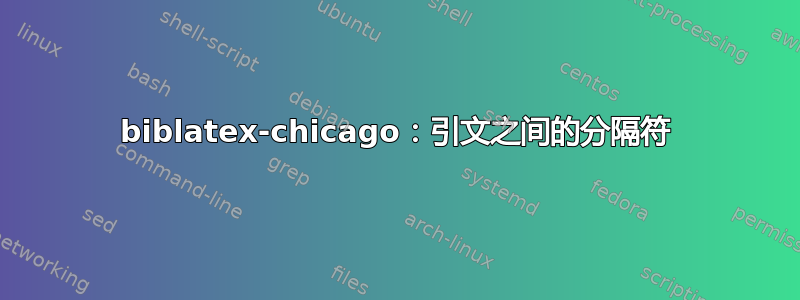
我正在使用该biblatex-chicago软件包为期刊撰写论文,需要脚注引用:
\usepackage[notes,natbib,isbn=false,backend=biber]{biblatex-chicago}
然而,在引用两个(或更多)来源并添加一些评论时,我遇到了问题。例如,在这种情况下:
\footcites[A argues 123. See][]{Zambernardi2011}[However, B believes 456. See][]{See2001}
输出如下:
A argues 123. See A, Titel, Journal, Year; However, B believes 456. See B, Titel, Journal Year.
我需要的是引用 A2003 后使用不同的分隔符。我不想使用分号,而是使用句号!
@article{Zambernardi2011,
Author = {Zambernardi, Lorenzo},
Date-Added = {2017-04-20 12:58:28 +0000},
Date-Modified = {2017-04-20 12:59:41 +0000},
Journal = {Review of International Studies},
Number = {3},
Pages = {1335-1356},
Title = {The impotence of power: Morgenthau's critique of American intervention in Vietnam},
Volume = {37},
Year = {2011}}
@article{See2001,
Author = {See, Jennifer W.},
Date-Added = {2017-04-20 12:57:29 +0000},
Date-Modified = {2017-04-20 12:58:22 +0000},
Journal = {Pacific Historical Review},
Number = {3},
Pages = {419-447},
Title = {A Prophet Without Honor: Hans Morgenthau and the War in Vietnam, 1955-1965},
Volume = {70},
Year = {2001}}
答案1
我仍然不太清楚为什么你看不到长引文和短引文\cite,但这能给出你想要的输出吗?我认为它比使用更具可读性\footcites。而且它确实给了你想要的句号。(请注意,这是@moewe 上面的替代答案,但提供了代码和输出)。
\documentclass{article}
\usepackage[notes,natbib,isbn=false,backend=biber]{biblatex-chicago}
\usepackage{filecontents}
\begin{filecontents}{\jobname.bib}
@article{Zambernardi2011,
Author = {Zambernardi, Lorenzo},
Date-Added = {2017-04-20 12:58:28 +0000},
Date-Modified = {2017-04-20 12:59:41 +0000},
Journal = {Review of International Studies},
Number = {3},
Pages = {1335-1356},
Title = {The impotence of power: Morgenthau's critique of American intervention in Vietnam},
Volume = {37},
Year = {2011}
}
@article{See2001,
Author = {See, Jennifer W.},
Date-Added = {2017-04-20 12:57:29 +0000},
Date-Modified = {2017-04-20 12:58:22 +0000},
Journal = {Pacific Historical Review},
Number = {3},
Pages = {419-447},
Title = {A Prophet Without Honor: Hans Morgenthau and the War in Vietnam, 1955--1965},
Volume = {70},
Year = {2001}
}
\end{filecontents}
\addbibresource{\jobname.bib}
\pagestyle{empty}
\begin{document}
\null\vfill
First Citation.\footnote{\citeauthor{Zambernardi2011} argues 123. See
\cite{Zambernardi2011}. However, \citeauthor{See2001} believes 456. See
\cite{See2001}.}
Subsequent citation.\footnote{\citeauthor{Zambernardi2011} argues 123. See
\cite{Zambernardi2011}. However, \citeauthor{See2001} believes 456. See
\cite{See2001}.}
\printbibliography
\end{document}
答案2
引用之间的分隔符称为\multicitedelim,你可以将其重新定义为句号
\renewcommand*{\multicitedelim}{\addperiod\space}
由于不是直接\multicitedelim用 设置的\setunit,因此以后很难纠正错误的分隔符选择。由于分隔符设置在我们无法知道下一个引用是否有预注的位置,因此我们也无法轻易地以此为条件。
因此,目前你可以手动切换\multicitedelim到\addperiod\space本地
\AtNextCite{\renewcommand*{\multicitedelim}{\addperiod\space}}
在需要句号的引用之前。
或者直接使用\footnote。如果您的文本较长,这将是一个非常有吸引力的选择。
\footnote{A argues 123. \cite[See][]{sigfridsson}. However, B believes 456. \[See][]cite{worman}}
预先说明的论证非常适合于诸如“参见”、“参见”之类的简短的介绍性“评论”,但不太适合较长的讨论。



